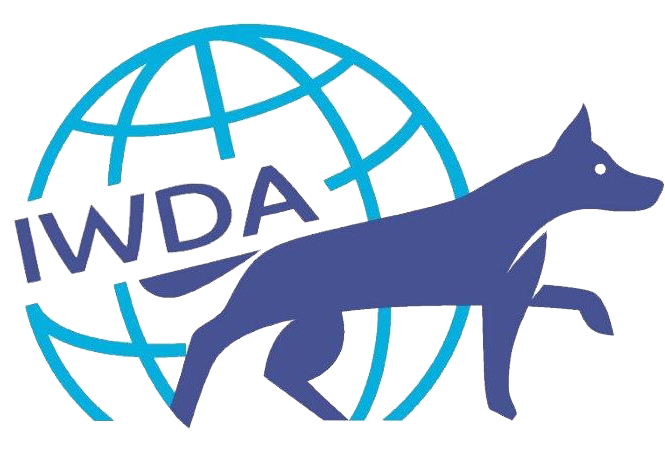IWDA Governance
IWDA is governed by a Board of Directors that has varied in size over the years. We are proud to have a Board who is dedicated to our mission and contributes to the development of further working dog science and best practice. Our Board represents different countries around the globe, and different specialisations within the working dog industry, which gives the IWDA a well-rounded perspective.
New Board members are chosen by the then current Board. Each Board member is elected for a four-year term, with an option to be re-elected for an additional four terms. The IWDBA Board generally meets by video conference monthly, but when feasible, the Board meets in person. By charter, the Board is required to meet at least annually, but this may or may not be in-person.

Walter Burghardt (United States)
Dr Burghardt was awarded his BA and MA in Psychology from Florida Atlantic University in 1974, his DVM in 1980 from the University of Florida, and his PhD in Biopsychology from the University of Maryland College Park in 1988. He is a Diplomate of the American College of Veterinary Behaviorists. Dr Burghardt has over 10 years experience in basic behavioral research and over 35 years experience in both private veterinary practice and a referral veterinary behavioral practice. Since 1995, he has been the Chief of Behavioral Medicine and Military Working Dog Studies for the LTC Daniel E Holland Military Working Dog Hospital at Lackland Air Force Base, Texas. He is responsible for the behavioral care of over 1,500 military working dogs around the world, educating Army veterinarians in applied behavioral medicine and for the implementation of a program of applied research and development regarding military working dogs. Dr Burghardt is also an Adjunct Professor in Biology at the University of Texas San Antonio and Director of the LTC Daniel E Holland MWD Hospital Behavior Residency Training Program. He is a retired Colonel in the US Air Force Reserve.
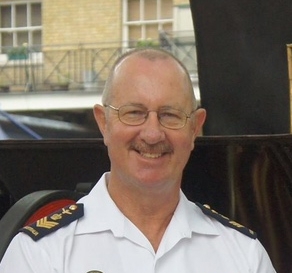
Al Grossman (Australia)
Alan Grossman enlisted in the Royal Australian Defence Force as a police dog handler in 1978. Alan has worked with both police and military working dogs and was part of a small team introducing Belgian Malinois into the Australian Defence Force.
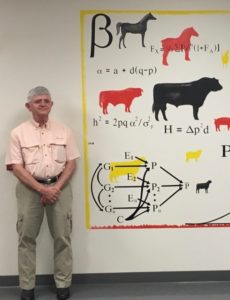
Eldin Leighton (United States)
The International Working Dog Registry (IWDR) provides a world-class record-keeping service for all organizations worldwide that breed working dogs in large numbers. Dr. Leighton, along with some volunteer help from others, began development of IWDR as a part-time project in 2012, but development became a full-time focus when he officially retired in 2015. For 20 years from 1995 through 2015, Dr. Leighton held the Jane H. Booker Chair in Canine Genetics at The Seeing Eye. In that position, he was responsible for managing the canine breeding program that, per year, produced about 200 Labrador Retriever puppies, 200 German Shepherd puppies and another 150 to 200 Golden Retrievers or Lab x Golden cross-bred puppies. Dr. Leighton first became associated with IWDBA when he attended the 2001 Conference in San Antonio, Texas. In 2005, Dr. Leighton was appointed to the IWDBA Board of Directors, then was subsequently elected as the Board's first President. Dr. Leighton’s experience in the dog breeding world was acquired first as the Research Geneticist working with the U.S. Army Bio-Sensor Research Division from 1973-1976, then as a consultant for The Seeing Eye from 1977 through 1994. After retiring from The Seeing Eye, Dr. Leighton started a private company, Canine Genetic Services, LLC, and through this company, he and others now provide annual maintenance and development support of IWDR for the IWDBA,

Kelly Mann (United States)
Dr. Kelly Mann is the Vice President of Veterinary Solutions, Mantel Technologies, Fort Collins, Colorado, USA, an affiliate faculty member at Colorado State University, and a Board member of the International Working Dog Association. He has decades of service and leadership experience in clinical veterinary medicine and veterinary research, especially with programs and projects directly applicable to US and allied military working dogs. Dr. Mann received his Bachelor of Science in 1986 from Georgia College, graduated from the University of Georgia, College of Veterinary Medicine in 1990 and completed a Master of Science in Veterinary Parasitology. He joined the US Army Veterinary Corps in 1993 and retired at the rank of Colonel in 2013. During his military career, Dr. Mann was the Director of the LTC Daniel E. Holland Military Working Dog Hospital and served in specialized training and leadership positions focused on military working dog medical care in Department of Defense, NATO and allied programs. He received a MS in Radiological Health Sciences from CSU, is a Diplomate of the American College of Veterinary Radiology, and earned a Master of Strategic Studies from the US Army War College. Dr. Mann is a member of the Order of Military Medical Merit and recipient of the Army Surgeon General's "9A" Proficiency Designator. His veterinary research interests include advanced imaging methods, medical procedures and surgical techniques that benefit animals and may lead to translational benefits for human patients. His career vision is to support world-class research at the highest level in his profession, tempered by compassion for the animals and people involved, and guided by ethical consideration for the health and welfare of each animal. Dr. Mann has a passion for all working dogs and the people they serve.

Paul Mundell (United States)
Appointed to Chief Executive Officer of Canine Companions for Independence in 2014, Paul Mundell has a long-standing record of capable and effective leadership within the organization. As National Director of Canine Programs and Corporate Secretary for 17 years, Paul oversaw and managed the entire canine program, from the puppy raising program to the breeding department, at the multi-regional and national levels. During this time, Paul increased the number of graduate teams by 80% and increased canine success rate by 65%. In addition to his work within the program, Paul forged strategic relationships with world-class research institutions that assist in the development of the canine program, by means of maximizing the health and working performance of Canine Companions dogs. These relationships include: Duke University Canine Cognition Center, Eukanuba Dog Foods, The Buck Institute, Emory University, Georgia Tech and Texas A&M University. In addition to these relationships, Paul formed joint ventures with foundations and corporations, which provided over $7 million towards unrestricted and project related funding along with in-kind donations. Most recently under Paul’s leadership, Canine Companions furnishes dogs for a study conducted by the Department of Veterans Affairs; this study aims to determine the potential benefits of canine support for veterans with post-traumatic stress disorder (PTSD). Paul also has a long standing history consulting to agencies, both domestic and international: Dognition, member of the Expert Advisory Panel; Marine Corps Warfighting Laboratory, where he assisted in a project to develop specialized search dogs; International Narcotics and Law Enforcement Office, where he provided guidance to Kazakh Border Guard Service and allied Central Asian States about the development of an effective working dog program. Paul is active in the local community and international community, as he has been a volunteer puppy raiser and breeder caretaker for Canine Companions, is the new North American President of Assistance Dogs International, and Vice-President of International Working Dog Breeding Association. Paul Mundell leads by example. Not only do his interests in scientific research guide Canine Companions towards excellence, growth, and innovation, but also his philosophic orientation towards the Platonic method facilitates an inclusive work environment where all members of the Canine Companions staff feel involved and valued. Paul Mundell has played an integral role elevating the standards by which Canine Companions’ mission, to enhance the lives of people with disabilities by providing highly trained assistance dogs and ongoing support to ensure quality partnerships, is enacted.
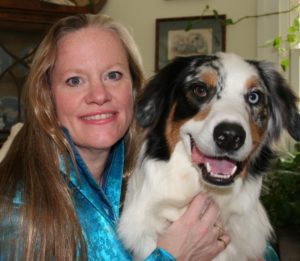
Karen Overall (United States)
Dr. Karen L. Overall holds BA, MA, VMD and PhD degrees and is a Diplomate of the American College of Veterinary Behaviorists (DACVB). She has served on the faculties of both the veterinary and medical schools at the University of Pennsylvania where she ran the Behavior Clinic at Penn Vet for more than a dozen years. Dr. Overall lectures at veterinary schools world-wide and is currently a Senior Research Scientist in the Biology Department at the University of Pennsylvania. Dr. Overall has given hundreds of national and international presentations and short courses and is the author of over 100 scholarly publications, dozens of textbook chapters and hundreds of abstracts, columns, commentaries, et cetera. Dr. Overall has also authored the texts Clinical Behavioral Medicine for Small Animals (Elsevier, 1997) and Manual of Clinical Behavioral Medicine for Dogs and Cats (Elsevier, 2013), and the DVD, Humane Behavioral Care for Dogs: Problem Prevention and Treatment (Elsevier, 2013). She is the founding editor-in-chief for Journal of Veterinary Behavior: Clinical Applications and Research (Elsevier). Dr. Overall has been named the North American Veterinary Conference (NAVC) Small Animal Speaker of the Year and in 2010 was named one of the The Bark’s 100 Best and Brightest - Bark Magazine’s list of the 100 most influential people in the dog world over the past 25 years. Dr. Overall serves and has served on numerous governmental committees focused on canine health and behavior, including the US Department of Defense’s Blue Ribbon panel on canine-post-traumatic stress disorder (C-PTSD). She also serves on numerous boards and has been the secretary of the IWDBA since its inception. Dr. Overall frequently consults with governments locally, nationally and internationally about legal and welfare issues of pet dogs and behavioral, welfare and performance issues pertaining to working dogs. Dr. Overall’s research focuses on neurobehavioral genetics of dogs, the development of normal and abnormal behaviors and how we assess behavior, especially as concerns working dogs.
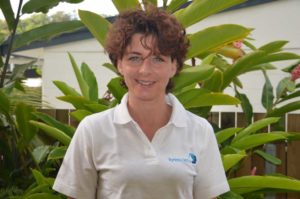
Esther Schalke (Germany)
Esther Schalke is a Doctor in veterinary medicine, graduated from the University of Hanover, Germany in 1996. She got her PhD in 2000, is a board certified specialist in animal behavior and a Diplomate of the ECVBM-CA. She worked as a postdoctoral research fellow at the Institute of Animal Welfare and Behavior, University of Veterinary Medicine Hanover from 1997 till 2012. Her research subject was aggressive behavior in dogs and learning behavior. In 2009 she founded the Lupologic GmbH: center of applied ethology and veterinary behavior medicine. She published numerous publications about aggressive behavior in dogs.

Hannes Slabbert (South Africa)
Dr Slabbert has been breeding and training working dogs for 32 years. He managed the South African Police Service Dog Breeding programme for 12 years. His international travels included visits to police and military training institutions in Australia, Austria, Belgium, Benin, Croatia, Germany, Norway, Russia, Poland, Singapore, The Netherlands, United Kingdom, United States of America, Zimbabwe and several other African countries. Dr Slabbert therefore has a broad knowledge of working dog breeding, training and research projects in most parts of the world. Between 1981 and 1985 he obtained a B.Sc. (Biological Sciences) and a B.Sc. (Honours) Zoölogy. He completed his M.Sc. (Ethology) during 1990 and his Ph.D. (Veterinary Ethology) during 1998, at the University of Pretoria. Dr Slabbert is an executive member of the International Working Dog Breeding Association (IWDBA) and a founder member of the South African Board for Companion Animal Professionals (SABCAP).

Per Arvelius (Sweden)
Having served the working dog community in different functions since 1991, Dr. Per Arvelius has acquired extensive experience. His main interests are how to breed and train dogs for service, and he has a strong understanding of challenges and solutions related to the production of working dogs. In January 2024, Per Arvelius was appointed to the IWDA Board of Directors. Per Arvelius was employed as researcher at the Swedish University of Agricultural Sciences from 2005 to 2015, where he also earned a PhD degree in Animal Breeding and Genetics. His research focused on how to measure, and breed for, behavioral traits in dogs. From 2016 to 2024, Per held the position as Breeding Program Manager for the Swedish Armed Forces Breeding Program for German Shepherd dogs, one of the world’s largest breeding programs for Military and Police Working Dogs. Since March 2024, he is employed as Research Coordinator at the Swedish Defense Research Institute. Prior to PhD studies, during the 1990’ies, Per Arvelius was a Military Dog Handler and a professional trainer of different types of working dogs. He later earned MSc degrees in Animal Science and in Biology. In 2003 and 2005, he was principal secretary for two governmental inquiries, resulting in new legislation concerning “dangerous dogs”, and suggestions for how to organise a Swedish breeding program for service/working dogs.
